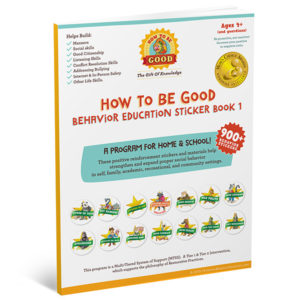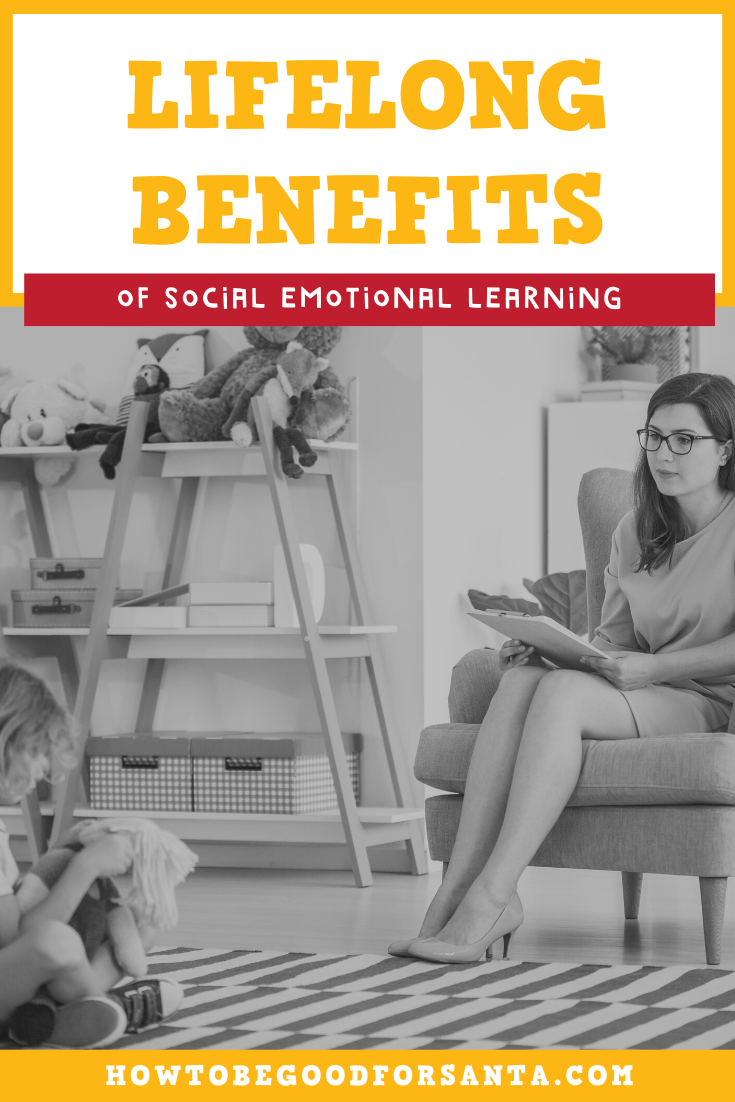13th Feb, 2020

Lifelong Benefits of Social and Emotional Learning
When we raise our children, we focus on creating the best possible environment to grow up in. We want them to succeed academically and socially and be as happy as possible. However, it can be frustrating when our children develop behavioral issues or seem unhappy despite you providing for them. However, investing in social and emotional learning may help foster your child’s behavioral health and increase their chances of success in later life.
Research shows that the more developed your child’s social and emotional abilities are, the better they will adapt to change and success in later life. Core developmental skills and social awareness are key to fostering emotional stability and health, as well as the ability to make better decisions and resolve conflicts without violence. Here are some of the benefits that social and emotional learning can provide for your child and what you need to know about fostering them within your family.
What Is Social and Emotional Learning?
Social and emotional learning, also known as SEL, is defined by the Collaborative for Academic, Social, and Emotional Learning as “the process through which children and adults acquire and effectively apply the knowledge, attitudes, and skills necessary to understand and manage emotions, set and achieve positive goals, feel and show empathy for others, establish and maintain positive relations, and make responsible decisions.” Simply put, SEL helps children become more in-tune with their emotions and plan their actions accordingly.
SEL provides tools for success to children particularly, with many studies showing that a heightened sense of social and emotional intelligence contributes to increased academic success and healthier relationships. SEL helps children know how to resolve conflicts, find solutions, manage and understand their emotions, and become better communicators – all skills necessary for a healthy and successful life.
The Collaborative for Academic, Social, and Emotional Learning (CASEL) states that SEL is comprised of five main components and social skills:
- Self-awareness skills refer to the ability for a child to recognize their own emotions. By understanding what they are feeling, the child can make links between their emotions and the thoughts and behaviors they engage in.
- Self-management skills refer to your child’s ability to regulate their emotions, thoughts, and behaviors. With well-developed self-management skills, your child can avoid making rash and irrational decisions that lead to consequences.
- Social awareness skills refer to your child’s ability to listen to the perspectives of others and demonstrate empathy. With social awareness, your child can avoid engaging in behaviors that would hurt other people.
- Responsible decision-making skills refer to your child’s ability to make sound, measured, and rational decisions about their behavior and their interactions. Again, this skill helps children avoid making rash and irrational decisions.
- Relationship skills help your child build and maintain healthy relationships, avoid toxic situations, and advocate for their needs along with honoring the other person’s needs.
All five components of SEL are vital to the development of a healthy human being. They foster growth not only in academic settings, but in future professional situations and in your child’s personal life as well. Research has proven that strong social and emotional learning skills contribute to a child’s future success in a number of ways.
Benefit #1: SEL Increases Academic Achievement
One of the most impressive long-term impacts of social and emotional learning is an increase in academic achievement. Researchers from CASEL, Loyola University, the University of British Columbia, and the University of Illinois at Chicago reviewed over 213 studies on the impacts of SEL. Their research found that students who engaged in SEL programs increased their academic achievement by 11 percentile-points over students who did not participate in SEL programs.
This study found that social and emotional learning improved more than just test performance in the classroom. Students who participated in SEL also showed a better attitude about themselves, others and school, as well as improved classroom behavior. They were also able to manage depression and stress better than their non-SEL counterparts. Students with better developed emotional intelligence have a greater chance at long-term academic success than other students.
Benefit #2: SEL Leads to More Positive Life Outcomes
A study from the American Journal of Public Health found that SEL may lead to better life outcomes for students who enter SEL programs than other students. The study examined the life path of students who attended the Fast Track Project when they were in kindergarten, which taught social skills as well as child competencies. 13 to 19 years after they received SEL training through the Fast Track Program, the researchers found compelling results.
According to the study, the students who received social skills education in kindergarten were less likely to be involved in criminal activity, receive public assistance or welfare, or have to live in public housing. Former Fast Track students were less likely to have a violent criminal record, have psychological or substance abuse problems, or suffer from depression from the students who did not participate in the program. By participating in SEL early on, your child can reap the benefits far into adulthood.
Benefit #3: SEL Increases Resilience in Traumatic Situations
Another benefit of SEL and social awareness skills is its ability to develop resilience within student participants. While we try to protect our children from trauma, many of them will witness violence or experience violence at some point in their lives. These traumatic experiences can have lasting impacts on their mental health and psyche, but SEL teaches skills so these children can respond to traumatic situations in a healthier way.
By developing social and emotional skills, children can parse through their emotions and understand what they are feeling. They can develop strategies to seek help and heal from their experiences, rather than allowing the trauma to hold them back in life. SEL can provide incredibly powerful tools for students to repair damage from trauma and build coping skills they can use for the rest of their lives.
Benefit #4: SEL Reduces Aggression and Violence
When children do not know how to cope or process their own emotions, this frustration can manifest into violent and aggressive behaviors. However, researchers found that SEL programming can reduce these behaviors in children – in fact, students who participate in these courses are 42% less likely to participate in physical violence at school.
SEL emphasizes mindfulness and being in touch with one’s emotions, which can keep children from making rash and violent decisions. These practices have a noticeable impact on reducing instances of violence and aggression at school and at home. SEL reduces the amount of instructional time that teachers spend responding to behavioral issues, allowing all students to learn more.
Benefit #5: SEL Prepares Children for Their Future Careers
As we progress further into the 21st century, more and more employers are valuing people who exhibit key SEL skills. According to the United States Department of Labor, employers are actively seeking employees who are good problem solvers, have high self-esteem, can work independently and motivate themselves, who can set their own goals, and who are skilled in communication and listening – all skills that students can cultivate through social and emotional learning.
Children who engage in relationship skills, social awareness skills, and other SEL practices from an early age are more prepared to enter the modern workforce than their non-SEL counterparts. This education increases employability and allows children to practice these skills before they enter a workplace environment.
Benefit #6: SEL Increases College Readiness
Along with increased academic success, SEL also gets students ready for college. Since children achieve higher scores and develop healthier classroom behaviors through this training, they are more likely to receive college acceptance offers. Children are more likely to attend school each day and their risk of dropping out decreases with SEL programming.
In addition, SEL teaches valuable skills to students who are leaving home for the first time to attend college. Since they have developed a sense of emotional maturity and resilience, they can encounter the new issues and situations at college in a calmer, more rational way. Children who participate in this programming are more likely to succeed on their own as college-aged adults.
Benefit #7: Social and Emotional Learning Can Improve Economic Mobility
Another benefit of SEL is its ability to reduce poverty and improve economic mobility for children who hold these skills. According to a report from the American Enterprise Institute and Brookings Institution, SEL may help reduce poverty in future generations. Not only are children with SEL skills more likely to increase their employability, they are able to work harder and solve more problems while they are in workplace environments since they do not have to grapple with emotional struggles.
Benefit #8: SEL Reinforces Positive Social Behavior
SEL not only provides benefits in the workplace and in the classroom – children who participate in social and emotional learning are more likely to have healthier social interactions. Students who participate in SEL programming get along better with other people and develop the relation skills necessary to maintain positive, healthy relationships with their families, friends, and teachers. Healthy social behavior can set a child up for future success – they can navigate friendships and relationships in a safer, more sustainable way than they could without social and emotional intelligence.
Benefit #9: SEL Decreases Emotional Distress
Social and emotional learning also decreases the instances of emotional distress in a child’s life. Because children have a greater understanding of their emotions, they report fewer instances of depression, anxiety, stress, and social withdrawal. Some studies may suggest that SEL can improve children’s self-regulation skills and decrease instances of emotional pain.
How Can Parents Incorporate Social and Emotional Learning in the Home?
SEL is a wonderful tool for parents looking to improve their child’s life outcomes. If you want to incorporate SEL into your daily routine, follow these tips.
- Be a good listener. Listening is a core competency skill, and children follow the examples of their parents. If you consistently interrupt your child or do not pay attention to what they are saying, your child may not value listening as much as they should.
- Invest in SEL educational materials to promote better behavior. Children respond well to incentives and learning, and there are many educational materials out on the market, from coloring books to sticker sheets, flashcards and more.
- Boost your child’s self-esteem. Children who feel better about themselves are happier, are able to adjust to difficult situations better, and perform better in the classroom. Give your child responsibilities around the home and give them chances to make their own choices and show appreciation for your child whenever they deserve it.
- Respect your child’s unique talents. Parents can compare their children to siblings, friends, or relatives, which can decrease their self-esteem. Instead, focus on respecting and honoring your child’s unique talents and abilities. Provide your child with as much support as possible in their academics, athletics, or other activities or relationships.
Behavior Sticker Books to Foster Social and Emotional Learning
If you want to boost your child’s relationship skills, social awareness skills, and other SEL components, you may need some extra help. Embarking on the SEL journey  alone can be a challenge, and certain educational materials can help cement these good behaviors in your child’s day-to-day actions. One way you can foster SEL in your home is by using the award winning How to Be Good’s Behavior Education Sticker Books.
alone can be a challenge, and certain educational materials can help cement these good behaviors in your child’s day-to-day actions. One way you can foster SEL in your home is by using the award winning How to Be Good’s Behavior Education Sticker Books.
Children love to learn when rewards are involved, especially when they include fun and interactive stickers from How to Be Good. When you invest in these educational materials, you receive over 900 custom stickers to reinforce proper social behavior goals with your children. Your child will listen, learn, practice, and use the proper SEL behaviors to earn stickers as you work through the book together.
In addition to the stickers, you will receive helpful tips and tools designed by educators and behavioral therapists to foster SEL with your child. You and your child will learn about listening skills, conflict resolution, bullying, and more skills to help your child grow and reap the benefits of social and emotional learning. You receive goal planning worksheets, lesson plans, incentive coupons, behavior tracking charts, and more when you invest in How to Be Good’s sticker books.
Are you ready to begin your child’s journey into SEL? Visit How to Be Good today to learn more about our award winning sticker books and other social and emotional educational materials to benefit your child’s future social success.
Write your comments
You must be logged in to post a comment.



